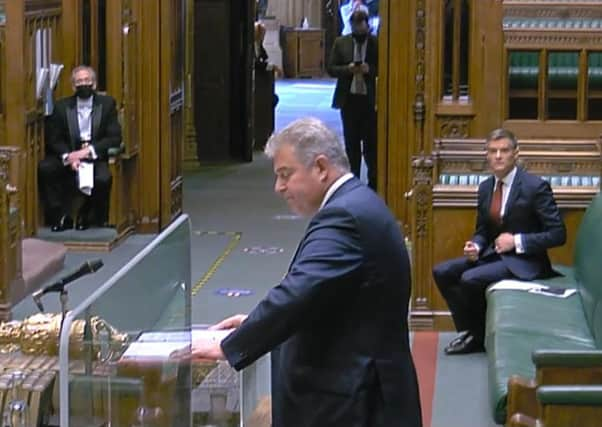NI Secretary: 2014 SHA ‘was arguably a statute of limitations for non-fatal crimes’


Brandon Lewis also said that he believed placing a two-year sentencing cap on serious criminal offences as part of the 1998 Belfast Agreement had been “absolutely” the right thing to do.
Mr Lewis has faced a fusillade of criticism ever since he outlined plans last week to permanently end all investigations into pre-1998 Troubles crimes.
Advertisement
Hide AdAdvertisement
Hide AdWhilst he has called it a “statute of limitations”, it is more commonly referred to as an amnesty.
In addition, his proposal would also bar any civil court cases and any further inquests into deaths.
Sinn Fein, the DUP, SDLP, Alliance and UUP – plus prominent victims’ and campaign groups from the South East Fermanagh Foundation to Amnesty International – have savaged the plans.
Such was the outcry that a specially-convened two-hour debate on the matter in the Stormont Assembly on Tuesday saw MLAs summoned back from their holidays to denounce the amnesty.
Advertisement
Hide AdAdvertisement
Hide AdAmong those speaking in Stormont was UUP leader Doug Beattie, who used his contribution to restate his party’s position that the Stormont House Agreement – which was drawn up in 2014 to get the DUP/Sinn Fein-dominated government back up and running – was in itself a kind of amnesty.
What that 2014 deal promised (among other things) was that the government would “establish a new independent body to take forward investigations into outstanding Troubles-related deaths; the Historical Investigations Unit”.
However, because the wording of the agreement refers only to “deaths” (and does not explicitly mention injuries) the UUP has taken it to mean that those who were wounded, but not killed, would not have their cases looked at by the new unit.
“If you support the Stormont House Agreement, you support a de facto amnesty,” Mr Beattie told the Assembly on Tuesday.
Advertisement
Hide AdAdvertisement
Hide Ad“Under the Stormont House Agreement, if you were left limbless, blind, burnt, in a wheelchair or psychologically damaged, you do not get an investigation.”
And yesterday, while quizzed about his proposal by MPs in the House of Commons, Mr Lewis (who is a former chairman of the Conservative Party) said that victims and survivors “want to be able to get to the truth and the accountability that comes with that”.
But he went on to say that “we also need to recognise, as I outlined last week, the reality of where we are today”.
He said that the current circumstances are a product of “the decisions, which I think were correct – I am not criticising them at all; they were absolutely the right decisions – to see peace and prosperity in Northern Ireland with the Good Friday/Belfast agreement and, in particular, the Northern Ireland (Sentences) Act 1998, which came with it, let alone what then followed, particularly with decommissioning and, as we have seen recently, quite rightly, arguably in effect a statute of limitations on 40,000 crimes coming out of Stormont House”.
Advertisement
Hide AdAdvertisement
Hide AdThe reference to 40,000 concerns the number of people injured during the Troubles; basically, it is the government’s estimate of the number of casualties, on top of the fatalities.
According to Ulster University’s CAIN service, from 1969 to 2001 inclusive, 3,532 fatalities occurred.
The biggest single group affected were civilians (1,785) followed by the Army (509, plus 196 UDR) and RUC (301).
More on the Troubles amnesty:
——— ———
A message from the Editor:
Advertisement
Hide AdAdvertisement
Hide AdThank you for reading this story on our website. While I have your attention, I also have an important request to make of you.
With the coronavirus lockdown having a major impact on many of our advertisers — and consequently the revenue we receive — we are more reliant than ever on you taking out a digital subscription.
Subscribe to newsletter.co.uk and enjoy unlimited access to the best Northern Ireland and UK news and information online and on our app. With a digital subscription, you can read more than 5 articles, see fewer ads, enjoy faster load times, and get access to exclusive newsletters and content. Visit https://www.newsletter.co.uk/subscriptions now to sign up.
Our journalism costs money and we rely on advertising, print and digital revenues to help to support them. By supporting us, we are able to support you in providing trusted, fact-checked content for this website.